- Home
- Michael Crichton
Dealing or The Berkeley-to-Boston Forty-Brick Lost-Bag Blues Page 9
Dealing or The Berkeley-to-Boston Forty-Brick Lost-Bag Blues Read online
Page 9
I went down Dunster Street, past Holyoke Center, and over toward the Houses. It was quieter there, and there wasn’t any traffic, and the trees had tiny flecks of green at the tips. Spring was getting its foot in the door and it suddenly didn’t seem so bad.
Once in the House I stopped to talk to Jerry, who wanted to know all about my vacation. Jerry is the superintendent, a cheerful, sly Irishman who will talk your ear off, given half a chance, and is a stickler for rules, especially those concerning women in the rooms. But Jerry understands those who understand him, and so for a few hours of conversation a term, and a couple of bottles of rye on the Savior’s birthday, Jerry is the most amenable and considerate super in the college. Hello, Jerry.
Then up to E entry, and John’s room on the first floor. John has a sign on the door which reads:
SEEK AND YE SHALL FIND
John finds this amusing, since his chicks think he means The Truth, while he means the chicks. The door opened to reveal Sandra’s lovely form. “How’d it go?” she asked.
I was tempted to ask her the same thing, seeing as how she was decked out in one of John’s bathrobes. But all I said was “Fine,” and went in and sat down.
John called from the bedroom, “That you, Pete?”
“Yeah.”
“Just a minute.”
Sandra was looking very chic and wealthily whorish as she put a record on the turntable and sat down across from me. She crossed her legs in the extraordinary way she has of crossing her legs, languidly, with a lazy shot of the bush in the process. Nothing offered, of course, but if she knew you and liked you, she didn’t mind letting you know her snatch was all still there.
“How’d it go?” she said again.
“Fine,” I said again.
“You look bushed.”
“I am,” I said.
Then John came out, wearing his other bathrobe. He has two Brooks foulard-print bathrobes. One is several sizes too small for him, and he tells the girls it was a present to him from his grandmother. But it’s handy for the girls. John is well-organized about that sort of thing.
“Thanks for meeting me at the airport,” I said.
“Hey,” he said, “what’s this I heard about—”
“A bust?”
John lit a cigarette. “Yeah.”
I shrugged. “It happened. I got busted.”
“And?”
“They dropped charges,” I said. “They couldn’t make it stick. It was this other guy’s dope in the car and they couldn’t make anything stick to me.”
John nodded. He didn’t seem terribly interested. He pointed to the suitcase. “You get it all?”
“Ten bricks,” I said.
“Far out,” he said. “Let’s have a look.” And as I opened the suitcase he said, in a very casual voice, “Was it Murphy who busted you?”
Typical John. The casual fuck with your head. I looked up. “Why?”
“It was Murphy who busted Ernie, you know.”
Thanks for the good news. “Yeah,” I said. “It was Murphy who busted me and I got off by agreeing to set you up. All you have to do is go down to Central Square tomorrow at ten, carrying these bricks—”
John managed a pretty realistic, hearty laugh. “You getting paranoid?”
“Me?” I said. “Paranoid? Why should I be? My deal’s firm.” John laughed again, even more convincingly. Then he cut open the brick and I could sit back and relax while he toked up.
The trouble with John is that he had an acid trip last fall and he dropped about two thousand mics with some people he didn’t know. The whole thing bent his head around the telephone pole. He never talked about the trip, but from the little he said you could tell he’d gotten very stoned and then very afraid, and decided that the only way he could handle it would be to control it. So he became a controller. Power trips with everyone, crappy little freak games and manipulations and adrenalin spurts passed out at the door, gratis. I had thought he didn’t play those games with me, but he did, of course. He played them with everyone.
Which is why John Thayer Hartnup III, of Eliot House and Cohasset, Mass., was into dealing at all. It was the only way it made sense. The son of the Right Reverend Mr. Walker Wingate Hartnup and the former Miss Ellie Winston (of South Carolina) hardly needed the bread. Even if the tobacco money went up in smoke and the Reverend’s investments died, Grandmother Wingate could be counted on to call down the First National bankers to her Plymouth home and transfer a few goodies. It was all very far from a question of bread.
Power was something else. A natural talent, it might be called, an inborn skill. He had been an attentive student at Dreyer Country Day, but he was later dismissed from Kent for what the headmaster, without being specific, had implied was a question of drug abuse. It might have had something to do with John’s consumption of the Mexican narcotic Cannabis sativa during Saturday football games. John had then spoken to the Headmaster in private, and a week later it was announced that John was not being dismissed, but rather had taken a leave of absence because of overwork and stress. No one ever found out what was discussed in the meeting, but John was fond of noting that even such people as Headmasters of distinguished prep schools had soft underbellies.
As a Fine Arts undergraduate at Harvard, a field he had chosen for its casual academic demands and its pretty girls, he had further opportunity to refine his techniques. There was, for example, his nervous breakdown at the end of his sophomore year—a six-week stay at Mass. Mental Health, which brought his parents around to a much more sympathetic stance toward him.
Not perhaps the nicest person, John, but successful in his way.
John lit up and inhaled. “Far out,” he said. “Count on Musty.” And he passed the joint to Sandra, and she passed it to me, and I waved it away.
“What’s happening?” he said.
“I’ve got to work. Hour exam tomorrow.”
“Come on,” John said. “Get serious.”
“Really.”
“You’re not going to do anything tonight,” John said, and he held the joint out to me. I knew it was true, took a hit, and sat back. Stoned again.
Only this time it was jangly and not very pleasant, because I was just back from the Coast, and as soon as I was stoned I felt distinctly rootless, lost somewhere between, and I began to flash on all the times I had felt that way before.
Usually it came from getting stoned with people you didn’t know and couldn’t get to know, for one reason or another—it was a sudden sensation of being completely alone, but not completely the master of your own ship; the sudden sensation of an immutable gap that separated you from the people you were stoned with. A sense that you were here and they were there; that you were different from them and always would be; that you were locked in yourself and the key was not merely thrown away, but dissolved in organic acid.
A very bothersome feeling.
It was especially bad when it happened with people that you knew, people that you knew too well, in fact. That was horrifying. And I flashed on the time I went home to see my parents.
Well, actually I was ordered down to see them. They threatened a lot of stuff if I didn’t come immediately. Because of these rumors they had heard. So about three in the afternoon I got off the train at the Woodfield Station and walked down Elm Street to the drugstore.
I called home after the druggist, a flatulent Rotarian named Mr. Willis, refused to sell me some Vitamin B12. He wouldn’t sell it to me because, he said, I needed a prescription, which was a lot of horseshit. I could remember the days when he’d told me I needed a prescription to buy prophylactics. Mr. Willis was the type of solid burgher who felt that the responsibilities vested in him by the community went beyond the purely medicinal. Anyway it was a pain in the ass not to be able to drop a few B12s, because if you’re really stoned on heavy dope B12 smooths things out a lot. And I was going to need all the smoothing out I could get.
The telephone conversation was short. My mother picked up t
he phone and said “Hello?” in the sugar-frosted voice that she reserves for those who aren’t in the family.
“Hello, mother, this is Peter.”
“Oh.” Danger, live wires. “Peter, where are you?”
“In Willis’s drugstore.”
“Where is that?”
“In town, mother.”
She got angry then. “In what town, young man?”
“In Woodfield, mother.”
“Oh.” She paused to consider that one. “Well, you’d better come on out here.”
“How?” I said.
“Take a taxi.”
“I haven’t got any money.”
“Oh, you don’t?” Very sarcastic. “I thought you’d just be rolling in money, from all your drug deals.”
So there it was, out in the open: they had found out I was dealing. What a bummer.
“Yeah, well, mother, I don’t.”
“Don’t what?”
“Have any money.”
“Then hitch a ride out,” she said. “Your father and I will be waiting.”
Click!
Very nice. A very nice and warm person, my mother. I went back outside onto Elm Street and lit up a joint. After three or four hits I felt better, and then I started laughing. Because it occurred to me how ridiculous it was for me to worry about seeing them. They were the ones who were shitting in their pants, just dying to lay into me, nervous as actors before they go on stage. It was their trip, not mine. I already knew by heart what they’d say to me, and once that was over with it didn’t much matter what I answered. It didn’t matter because my parents didn’t have the slightest interest in what I was really up to—in fact, they preferred to remain in the dark. No, the whole point of this scene was to give my parents the opportunity to feel that they were doing their job, fulfilling their obligations to me and to society. In a way they did care what I did; but they cared a hell of a lot more that I knew how they felt about what I did. Groovy. Off to the wars.
I wandered down to the train station and got a taxi, and told the guy my parents would pay him when we got there. Staring out at the Connecticut landscape on the way to the house, I decided I ought to relax a bit. I really wasn’t being fair to the parents. I mean, there was no sense in going out there to have a big fight, anybody could do that. I figured that I’d surprise them and be really nice and sympathetic to their trip, and then after things got rolling, and everything was cool, then maybe I could really start talking to them. What the hell, it was worth a try. And I had to be the guy to try, because they sure weren’t going to. I laughed when I realized that I was thinking the way a magazine article in Redbook would read. Christ, I could see it now. Noted Young Freak Says: Generation Gap the Kids’ Fault! Rock star Lucifer Harkness bemoans his lack of sympathy and understanding for his parents in his adolescence, and takes all the blame for his rupture with them himself! Amen.
“Which way now, bud?” said the driver.
“Right here, the last house on the left. You can’t miss it.”
“Pay the what?” my father said.
“Taxi,” I said.
“What the hell for?”
“He’s waiting outside,” I said.
“Pay him yourself.”
“I don’t have any money.”
“You never have any money,” my father said. “Rich son of poor parents.” That’s one of his favorite lines. I don’t know where he learned it.
“Well, Dad, someone has to pay him.”
“You go out and pay him.”
“I don’t have any money.”
We often have conversations like this. Merry-go-round conversations. You go around the circle once, and it doesn’t work, so you go around again.
“Well then,” he said, “go out and tell him you can’t pay him.”
“Shit, Dad.”
“I might have thought college would teach you more original expression—”
“Shit, Dad. Just pay the guy, will you?”
My father sucked on his pipe and snorted. “Wait here,” he said, and went out to pay the taxi driver. When he came back, his face was tight and creased at the corners of his mouth. He was chewing furiously on his pipe. “Your mother,” he said, “is very upset. You’ve made her very upset. So try and be civil when you talk to her, and remember that she loves you very much.”
Mother was in the living room, wedged between the two grand pianos. Nobody ever played them, but there they sat, giving the house class. Mother was looking frail and tearful, and it was obvious she had been looking forward to this scene for a while.
“Oh, Peter,” she sighed when she saw me.
“Hello, mother.”
“Oh, Peter,” she sighed again, shaking her head.
“What’s the matter, mother?”
“Oh, Peter,” she sighed. “Oh, Peter.”
My father came in behind. He fixed me with his piercing legal stare, as if I were a walking misbalanced ledger.
“Well now,” he said.
“Oh, Peter,” she said.
“Do you want your pill, dear?” my father said.
“No, dear,” she said, “I already took it.”
“What pill?” I said.
“Well now,” my father said, turning to me. “Sit down, Peter.” I sat down. They sat down. We were all very composed. “You have some explaining to do,” he said.
My mother chose that moment to begin crying. “Where did we go wrong, Peter?” she said. My mother cries quietly, no wracking sobs, just tears running down as she stares at you, and she won’t wipe them away. It can be very effective.
“Go wrong?” I said.
“Look here, Peter,” my father said, relighting his pipe and billowing up smoke screens, “your mother and I have heard some rumors.”
“They’re not rumors,” she said, sniffling, not brushing away the tears.
“All right then,” my father said, “let’s say we’ve been told—”
“By who?” I said, jumping right in. I might as well get the story straight.
“Whom,” my father said. “That’s not important. We’ve been told—”
“I want to know who,” I said. “Mmmmm.”
“That’s not important. We’ve been told you are selling marijuana at school. Is that true?”
“Just look at him,” my mother said, interrupting. “Look at the way he looks. Don’t you have any decent pants, Peter? Those blue jeans with the holes. And your shoes—do you need new shoes?” She looked at her watch. “The barbershops are open until six. We can get—”
“Is it true?” my father asked, fixing me with his legal eye again.
“Yes,” I said.
“Oh, Peter,” my mother sighed.
“You’ve upset your mother very much,” my father said. He turned to her. “Can I get you a Kleenex, dear?”
“No, dear, I’ll be fine. I’m fine.” Crying silently.
“You’re crying, mother,” I pointed out.
“Oh, Peter, Peter …”
“I’ll get you a Kleenex,” my father said, and bolted for the bathroom. He came back with a handful and sat down again. “So it is true,” he said, looking back at me.
“Yes,” I said.
“Well … don’t you know it’s against the law?”
“Yes.”
“Well, doesn’t that matter to you?”
“No,” I said.
“But it has to matter,” my father said. “It’s the law.”
Now what could I say to that? I’m sorry, it doesn’t matter, it just doesn’t.
“I don’t understand how you can grow up thinking this way, acting this way,” my father said.
“It’s the school,” my mother said. “We should never have sent you away to that school. I knew something like this would happen if we let you go there.”
“Now, mother—”
“Well, just look at you, sitting there like something the cat dragged in,” she said, letting teardrops spatter on her Villager dress.
“Look,” I said, “will everybody stop acting like it’s such a big deal?”
“It is a big deal,” my father said.
“Dad, look, everybody blows grass at school. Everybody.”
“Perhaps everybody that you know, Peter. But I hardly think that—”
“Between ten and twenty million people in this country blow grass.”
“I should think,” my father said, “that those figures would be very difficult to substantiate.”
At this point I sat back. There was no sense in an argument. I used to argue all the time with my parents but it never did any good. One time I’d had an argument with my mother over Vietnam, and she’d questioned some figures I’d used on war spending. “I don’t believe those,” she said. “Where’d you dig those figures up?” “Bernard Fall, mother.” At that, she’d looked irritated. “Well, who in God’s name is Bernard Fall?” she’d said. Oh well. I could tell from my father’s voice that it was Perry Mason time again, and I was in the witness box.
“I said,” my father said, “that those figures should be damn near impossible to substantiate.”
“Look,” I said, “do you know anyone who doesn’t drink?”
“That’s not the issue.”
“I’m just asking.”
“Yes. I know some people who don’t drink.”
“But not many,” I said.
“We also know some alcoholics,” my mother said, “for that matter we know several people—”
“Peter,” my father said, interrupting firmly, “there’s a difference. Alcohol is legal. Marijuana is not. You can go to jail, Peter. Now, you’ve lived a sheltered life, all your life. We’ve tried to see that you were protected against such things. But let me tell you now, Peter. Jail is not pleasant. You wouldn’t like it one bit, not one bit.”
I sighed. What could I say?
“Now look, Peter. There’s nothing we can do about you. There’s no way we can stop you or alter your course of action. Looking back, I don’t think that there’s ever been anything that we could do, as parents. You were always different from the others in the family, always … different. But as your parents, we have to tell you when we think you’re making a mistake. Can you understand that?”

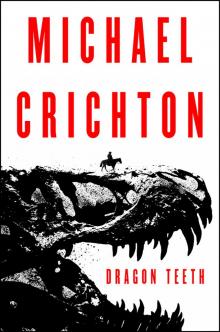 Dragon Teeth
Dragon Teeth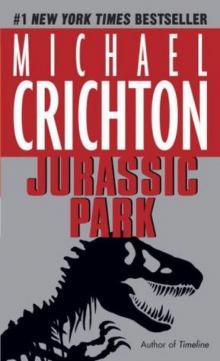 Jurassic Park
Jurassic Park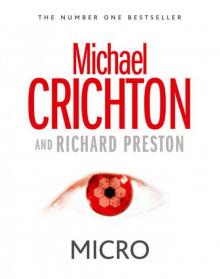 Micro
Micro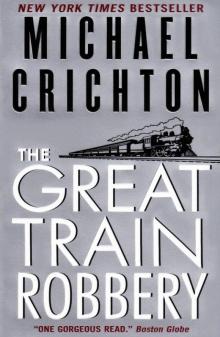 The Great Train Robbery
The Great Train Robbery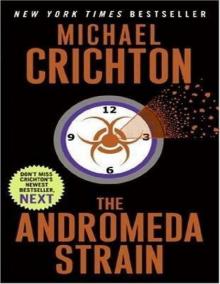 The Andromeda Strain
The Andromeda Strain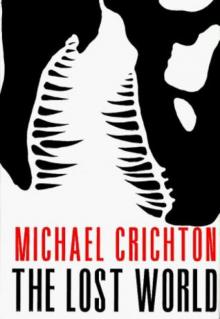 The Lost World
The Lost World Congo
Congo Travels
Travels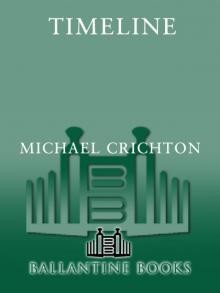 Timeline
Timeline Sphere
Sphere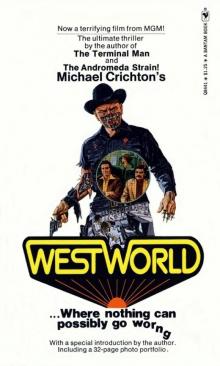 Westworld
Westworld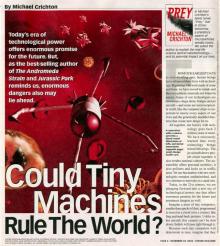 Prey
Prey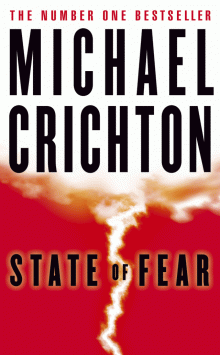 State Of Fear
State Of Fear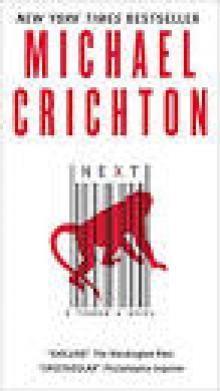 Next
Next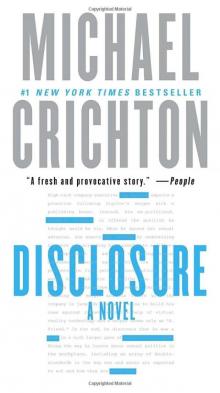 Disclosure
Disclosure Pirate Latitudes
Pirate Latitudes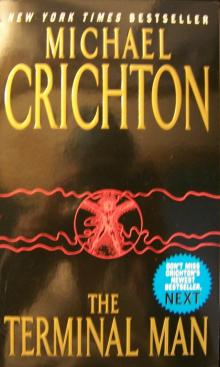 The Terminal Man
The Terminal Man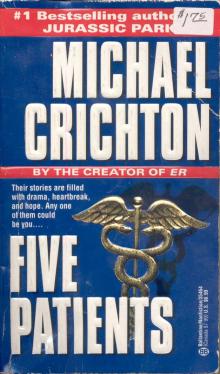 Five Patients
Five Patients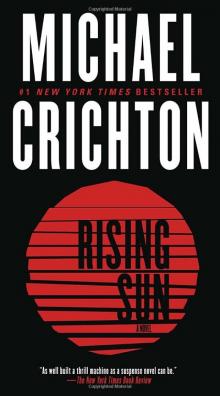 Rising Sun
Rising Sun Binary
Binary The Andromeda Evolution
The Andromeda Evolution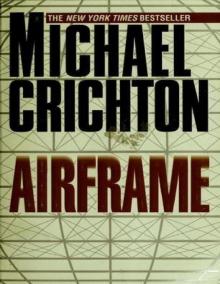 Airframe
Airframe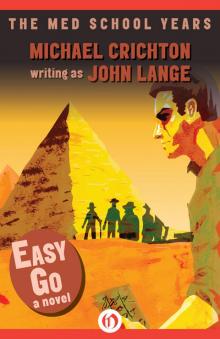 Easy Go
Easy Go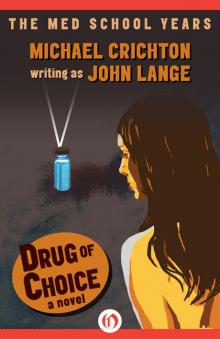 Drug of Choice
Drug of Choice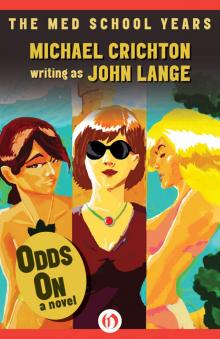 Odds On: A Novel
Odds On: A Novel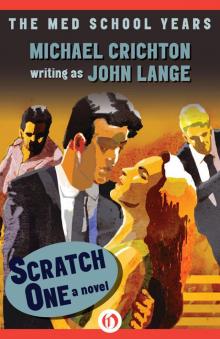 Scratch One
Scratch One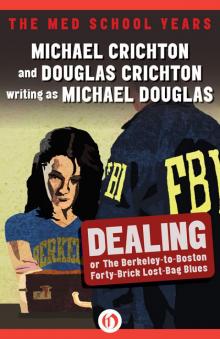 Dealing or The Berkeley-to-Boston Forty-Brick Lost-Bag Blues
Dealing or The Berkeley-to-Boston Forty-Brick Lost-Bag Blues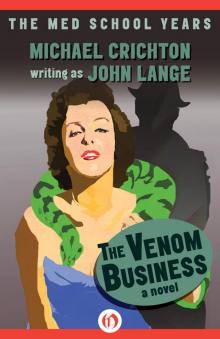 Venom Business
Venom Business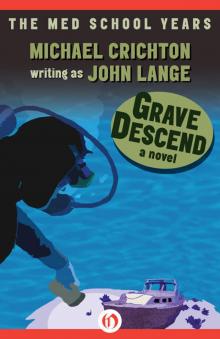 Grave Descend
Grave Descend Gold - Pirate Latitudes
Gold - Pirate Latitudes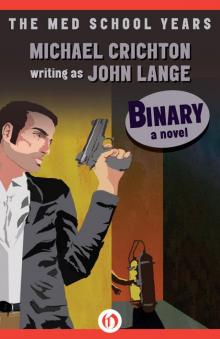 Binary: A Novel
Binary: A Novel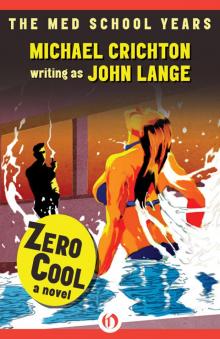 Zero Cool
Zero Cool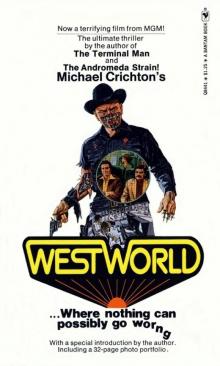 Delos 1 - Westworld
Delos 1 - Westworld